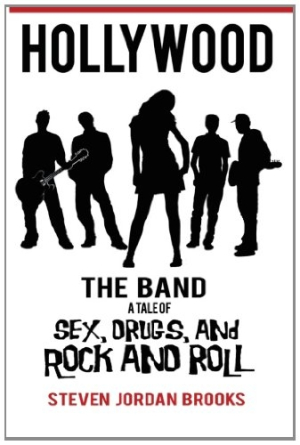Hollywood the Band
A Tale of Sex, Drugs, and Rock and Roll
Rocking out with his garage band, many a young musician dreams of hitting it big. In Hollywood the Band, Steven Jordan Brooks offers some insight into what it takes to make those dreams come true, as he presents the story of Hollywood, a fictional 1970s California band determined to make it to rock stardom. Subtitled A Tale of Sex, Drugs, and Rock and Roll, the book is most successful with the rock and roll part of the story. In fifty chapters, each named for a popular song, Brooks reveals facets of the music industry that reflect his own past as a performer, manager, and producer. His insider’s perspective is what makes the book worth reading. Other aspects of the story are uneven, some sections drag, and the mulitple story lines are not equally engaging.
The band members and their managers and crew are decently developed characters, but they are not free of stereotypes. Cliché abounds in statements like, “We were high on drugs and high on life,” and “united we were one.” Brooks includes authentic slang from the seventies to the point of annoyance, repeatedly using “That’d be bitchin’” and “bitchin’ idea.” Brooks sometimes uses conversations between the characters to fill in background details, and the dialogue that results can be stilted. For instance, it is difficult to imagine why a young man in his early twenties would have to explain to a contemporary that, “I had to maintain my student deferment so that I could get out of the military since there had been a draft and that was one way to avoid it.”
Brooks’ references to free love and wild sex add nothing new to the now-standard rock-and-roll lifestyle story. “I like sex without love. I guess that’s why I’m able to have fun,” is as philosophical as Brooks’ characters get, and the multiple accounts of sexual encounters add little of substance.
Ever-present in huge quantities, drugs, too, reflect the culture and the era, but Brooks adds a special twist with a band manager who is a dealer. This side plot seems somewhat improbable but it does function as a nice balance to the band’s development. That one “friend” would finance everything for the band—that this friend had dealings with both the mob AND the DEA seemed a bit much. As the band develops the drug dealing seems to intensify and in the end, as the band becomes successful, the drug dealing manager goes down.
The text is not well edited. Missing words and punctuation create unintentional humor in phrases like, “as if he had epiphany,” which sounds like a disease, and “Want a hit man?” which, considering the drug dealer’s Mafia connections, could easily mean something other than a toke. Confusing “chords” and “cords” seems unforgivable in a book about music. Clothing with “sequences” instead of “sequins,” and moustaches that “compliment” rather than “complement” swarthy complexions take on inadvertent new meanings.
At its core, Hollywood the Band is a good story, but the book is unnecessarily long and tedious. The band maintains its own goal: “becoming an originals band, performing their own material, getting a record deal, and being an original recording and touring band,” and that is the story to follow. Much of the rest of the story is extraneous.
Reviewed by
Cheryl Hibbard
Disclosure: This article is not an endorsement, but a review. The publisher of this book provided free copies of the book and paid a small fee to have their book reviewed by a professional reviewer. Foreword Reviews and Clarion Reviews make no guarantee that the publisher will receive a positive review. Foreword Magazine, Inc. is disclosing this in accordance with the Federal Trade Commission’s 16 CFR, Part 255.

